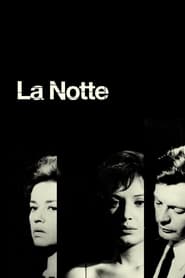
Love is such a universal and fascinating subject which dwells deeply into our deep felt meanings of life and living. It is no wonder that it is one of the main forces that drives creativity from music, literature and of course cinema. Being an emotion that means so much to us humans allows it to become such a great focal point that drives people into the wonders and adventures of life. A life without love is considered a life lost. I have known people who have distained relationships and emotions when young to become desperate for it in their later years. Michelangelo Antonioni is a film director who in 1960 with his groundbreaking film, “L’Adventura”, attempted to show us the result of a wasted life, lacking real love. In his follow up film, “La Notte”, he zeroes in on two people who once felt and had love and now find it slipping away. He does this within a short time span of 24 hours in their lives. Giovanni Pontano (Marcello Mastroianni in a dead pan cold portrait), is a fairly successful writer who just completed his latest novel. His wife is the beautiful Lidia (Jeanne Moreau, equally cold in her performance), and we come to find out that she differed her own dreams to those of her husband’s. The film begins in midday, with the couple visiting a dying friend. It is the mortality of this dear friend of theirs that serves as the catalyst that will drive both people into a cold awareness as to how empty their lives have become. That is the core and heart of the movie. From the hospital they briefly attend a book opening party for Giovanni’s new book, go home, attend a burlesque night club and then finally a high class, all night party at the gaudy villa of one of their millionaire acquaintances. They drift, wonder and get caught up in flirtations. One of which is abruptly stopped by the third party and another that Lidia stops herself. In between we are treated to exquisite depictions of the world around them. L’Adventura” centered on the empty, horrid life of the filthy rich. Here our protagonists have not actually arrived at the status but think they want to be there. Their own simple adventure within this night of realization opens their eyes to what has happened to their lives. Within this simple but complicated setting there are numerous scenes of interest and fascination. After the book opening party, Lidia grabs a taxi and goes out to the city on her own. This is the city of Milan which is more industrial then exotic and its cold façade blends in well with the story. Once alone we see Lidia seeking the attention of men, almost in a sense of prostitution but with clear limits. At one point she comes across what is clearly a group of working class men out to watch two of them fight. Lidia is captivated but feels she has to interfere when one of the fighters is clearly hurting the other. It is here that Antonioni shows us the dark danger of crossing the line. The fine line of violence and lust allows us to feel that Lidia is in danger. There is also a scene in the beginning of the film where a clearly mentally deranged hospital patient sexually assaults a willing Giovanni. Again the action is stopped before a line is crossed. At the millionaire’s party a sudden thunderstorm causes the party goers to act like little children, almost as if we are shown how nature and reality do not exist in their world. The wonderings and visual depictions of emotions shown here reminded me a great deal the great Stanley Kubrick’s last film, “Eyes Wide Shut”, except while that film seemed to depict a dream based on angst; this one shows us a life slipping away. “La Notte” is one of those films that made me think of life, love and what is important. That is quite an achievement.

